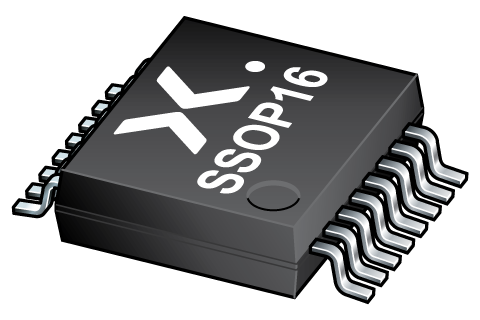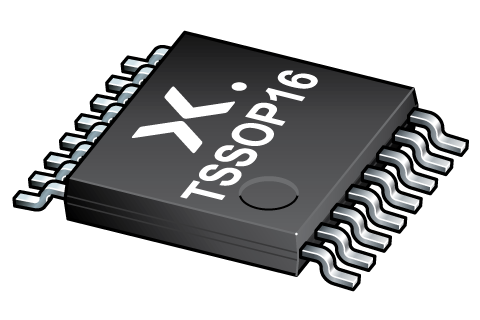
Register once, drag and drop ECAD models into your CAD tool and speed up your design.
Click here for more information74LV123DB
Dual retriggerable monostable multivibrator with reset
The 74LV123 is a dual retriggerable monostable multivibrator with reset. The basic output pulse width is programmed by selection of external components (REXT and CEXT). Once triggered this basic pulse width may be extended by retriggering either of the edge triggered inputs (nA or (nB). By repeating this process, the output pulse period (nQ = HIGH, nQ = LOW) can be made as long as desired. Alternatively, an output delay can be terminated at any time by a LOW-going edge on input nRD. Control inputs include clamp diodes. This enables the use of current limiting resistors to interface inputs to voltages in excess VCC. Schmitt-trigger action at nA and nB inputs makes the circuit tolerant of slower input rise and fall times.
Alternatives
Features and benefits
Wide supply voltage range from 1.0 V to 5.5 V
CMOS low power dissipation
Latch-up performance exceeds 100 mA per JESD 78 Class II Level B
Optimized for low-voltage applications: 1.0 V to 3.6 V
Accepts TTL input levels between VCC = 2.7 V and VCC = 3.6 V
Typical output ground bounce: < 0.8 V at VCC = 3.3 V and Tamb = 25 °C
Typical HIGH-level output voltage (VOH) undershoot: > 2 V at VCC = 3.3 V and Tamb = 25 °C
DC triggered from active HIGH or active LOW inputs
Retriggerable for very long pulses up to 100 % duty factor
Direct reset terminates output pulses
Schmitt-trigger action on all inputs except for the reset input
Complies with JEDEC standards:
- JESD8-7 (1.65 V to 1.95 V)
- JESD8-5 (2.3 V to 2.7 V)
- JESD8C (2.7 V to 3.6 V)
- JESD36 (4.5 V to 5.5 V)
ESD protection:
HBM: ANSI/ESDA/JEDEC JS-001 class 2 exceeds 2000 V
CDM: ANSI/ESDA/JEDEC JS-002 class C3 exceeds 1000 V
Multiple package options
Specified from -40 °C to +85 °C and from -40 °C to +125 °C
Parametrics
| Type number | Package name |
|---|---|
| 74LV123DB | SSOP16 |
PCB Symbol, Footprint and 3D Model
| Model Name | Description |
|---|---|
|
|
Package
All type numbers in the table below are discontinued.
| Type number | Orderable part number, (Ordering code (12NC)) | Status | Marking | Package | Package information | Reflow-/Wave soldering | Packing |
|---|---|---|---|---|---|---|---|
| 74LV123DB | 74LV123DB,118 (935210260118) |
Withdrawn / End-of-life |

SSOP16 (SOT338-1) |
SOT338-1 |
SSOP-TSSOP-VSO-REFLOW
SSOP-TSSOP-VSO-WAVE |
Not available | |
| 74LV123DB,112 (935210260112) |
Obsolete | Not available |
Environmental information
All type numbers in the table below are discontinued.
| Type number | Orderable part number | Chemical content | RoHS | RHF-indicator |
|---|---|---|---|---|
| 74LV123DB | 74LV123DB,118 | 74LV123DB |
|
|
| 74LV123DB | 74LV123DB,112 | 74LV123DB |
|
|
Documentation (7)
| File name | Title | Type | Date |
|---|---|---|---|
| 74LV123 | Dual retriggerable monostable multivibrator with reset | Data sheet | 2024-01-15 |
| Nexperia_package_poster | Nexperia package poster | Leaflet | 2020-05-15 |
| SSOP16_SOT338-1_mk | plastic, shrink small outline package; 16 leads; 0.65 mm pitch; 6.2 mm x 5.3 mm x 2 mm body | Marcom graphics | 2017-01-28 |
| SOT338-1 | plastic, shrink small outline package; 16 leads; 0.65 mm pitch; 6.2 mm x 5.3 mm x 2 mm body | Package information | 2022-06-20 |
| SSOP-TSSOP-VSO-REFLOW | Footprint for reflow soldering | Reflow soldering | 2009-10-08 |
| lv | lv Spice model | SPICE model | 2013-05-07 |
| SSOP-TSSOP-VSO-WAVE | Footprint for wave soldering | Wave soldering | 2009-10-08 |
Support
If you are in need of design/technical support, let us know and fill in the answer form we'll get back to you shortly.
Models
| File name | Title | Type | Date |
|---|---|---|---|
| lv | lv Spice model | SPICE model | 2013-05-07 |
PCB Symbol, Footprint and 3D Model
| Model Name | Description |
|---|---|
|
|
How does it work?
The interactive datasheets are based on the Nexperia MOSFET precision electrothermal models. With our interactive datasheets you can simply specify your own conditions interactively. Start by changing the values of the conditions. You can do this by using the sliders in the condition fields. By dragging the sliders you will see how the MOSFET will perform at the new conditions set.
